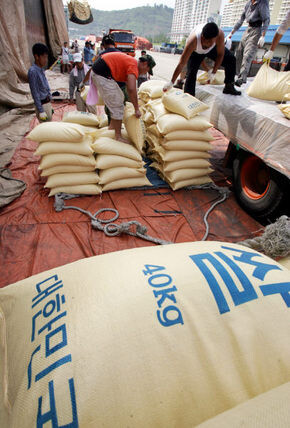hankyoreh
Links to other country sites 다른 나라 사이트 링크
S. Korea between a rock and a hard place on food aid to N. Korea

The South Korean government is in a quandary on how to provide food aid to North Korea, in another setback for Seoul because its government-level relations with Pyongyang have been strained since the inauguration of the South’s conservative President Lee Myung-bak.
Seoul’s dilemma comes amidst an increase in efforts by the international community to help North Korea, which the United Nations says is facing a severe food crisis. With rapid progress on the issue of the North’s nuclear declaration via the six-party talks aimed at persuading North Korea to abandon its nuclear ambition, the United States also said it would send 500,000 tons of food to Pyongyang. However, the South Korean government has continued to reiterate that it will provide food aid to the North, “only if North Korea requests it.”
The problem is that North Korea may not request food aid from the South. North Korean leader Kim Jong-il, commenting about the North’s food situation, was quoted by the North’s Korean Central Broadcasting Station on May 14 as saying, “At this time, there is no more urgent or important task than resolving the issue of feeding the people.” However, on May 10, the Rodong Sinmun, the North’s official newspaper, emphasized in an editorial that the food problem should be resolved by North Korea itself.
In the beginning, the South Korean government was fully confident about matters related to food assistance to the North. A senior South Korean government official said recently, “We have no reason to hurry.”
The South Korean government had expected North Korea to request food aid, given the seriousness of its food shortage. However, as the six-party talks on the North’s nuclear program began to make swift progress after bilateral meetings between Pyongyang and Washington, South Korea came under pressure because it suddenly appeared to be isolated from the issue of food aid to the North
On May 15, a high-ranking official at the presidential office of Cheong Wa Dae, or the Blue House, said, “If conditions are right, we will provide humanitarian aid to the North at any time.” The remark opened a window for the South, and could have allowed it to provide the North with aid regardless of Pyongyang’s request for it. But that was the last bargaining chip on the table. South Korea felt that it was unable to make a proposal for food aid to North Korea because it could be rejected by the North, which would cause the South to lose face, so some say that the South Korean government may have wanted the food aid sent through international agencies such as the World Food Program. However, there is skepticism about that within the government because, with large-scale food aid coming from an international agency, South Korea would not be able to use food aid as leverage in inter-Korean relations. This kind of aid would cost more and would not be in line with South Korea’s policy of providing food aid to the North as a loan, officials say.
In the midst of all of this, the ruling Grand National Party has been accusing the government of stubbornness. In a party meeting on May 15, GNP floor leader Ahn Sang-soo said, “For whatever reason, without thinking about several conditions, the government needs to consider providing food (to North Korea) with a humanitarian perspective, to help our brothers.” The government is in quagmire that seems only to be getting deeper.
Please direct questions or comments to [englishhani@hani.co.kr]
Editorial・opinion
![[Column] Park Geun-hye déjà vu in Yoon Suk-yeol [Column] Park Geun-hye déjà vu in Yoon Suk-yeol](https://flexible.img.hani.co.kr/flexible/normal/500/300/imgdb/original/2024/0424/651713945113788.jpg) [Column] Park Geun-hye déjà vu in Yoon Suk-yeol
[Column] Park Geun-hye déjà vu in Yoon Suk-yeol![[Editorial] New weight of N. Korea’s nuclear threats makes dialogue all the more urgent [Editorial] New weight of N. Korea’s nuclear threats makes dialogue all the more urgent](https://flexible.img.hani.co.kr/flexible/normal/500/300/imgdb/original/2024/0424/7317139454662664.jpg) [Editorial] New weight of N. Korea’s nuclear threats makes dialogue all the more urgent
[Editorial] New weight of N. Korea’s nuclear threats makes dialogue all the more urgent- [Guest essay] The real reason Korea’s new right wants to dub Rhee a founding father
- [Column] ‘Choson’: Is it time we start referring to N. Korea in its own terms?
- [Editorial] Japan’s rewriting of history with Korea has gone too far
- [Column] The president’s questionable capacity for dialogue
- [Column] Are chaebol firms just pizza pies for families to divvy up as they please?
- [Column] Has Korea, too, crossed the Rubicon on China?
- [Correspondent’s column] In Japan’s alliance with US, echoes of its past alliances with UK
- [Editorial] Does Yoon think the Korean public is wrong?
Most viewed articles
- 1‘We must say no’: Seoul defense chief on Korean, USFK involvement in hypothetical Taiwan crisis
- 2N. Korean delegation’s trip to Iran shows how Pyongyang is leveraging ties with Moscow
- 3‘Weddingflation’ breaks the bank for Korean couples-to-be
- 4Will NewJeans end up collateral damage in internal feud at K-pop juggernaut Hybe?
- 546% of cases of violence against women in Korea perpetrated by intimate partner, study finds
- 6[Column] Park Geun-hye déjà vu in Yoon Suk-yeol
- 7“Parental care contracts” increasingly common in South Korea
- 8[Column] Yoon’s first 100 days should open our eyes to pitfalls of presidential system
- 9[Interview] Dear Korean men, It’s OK to admit you’re not always strong
- 10[Editorial] New weight of N. Korea’s nuclear threats makes dialogue all the more urgent